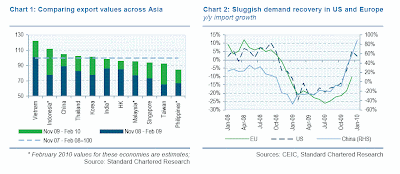Leading indicators and commodity prices are pointing to a sturdy recovery, but based on corporate feedback, the outlook for orders remains cloudy at best
Hmmm... While looking at Asian exports, the tone does not get much more optimistic:
Despite these positive indicators, there are still concerns on the horizon. As noted above, the recovery in US and European demand is still at a nascent stage. An expected slowdown in the recovery in the West in H2-2010 means that Western buyers are still taking a conservative approach to orders, buying for the near term and avoiding committing to orders beyond two to three months ahead. China’s commodity import boom may also fizzle in the months ahead due to high inventory and the return of domestic supply as local mines reopen after the winter. Prospects of stronger Asian exchange rates pose another challenge to Asian exporters. Regardless of China-US tensions over the USD-CNY exchange rate, Asian currencies are expected to appreciate on the back of capital inflows, and this could slow the recovery in Asian exports. Many South East Asian exporters face intense competition from China, both in Western and Asian markets. This is especially true of Thailand and Malaysia, whose manufacturing industries have considerable overlap with China’s. This competition is likely to put even more pressure on exporters in Asia ex-China during the recovery phase.
Click on charts to enlarge, courtesy of Standard Chartered.
 As to exchange rate fallacy, and clear US policy, the Nobelist international trade economist Paul Krugman had to do an explaining still yesterday. Obviously, the US has exclusive rights for currency debasement, BUT still the European competition from front-runners like Latvia, Greece may be fierce ...
As to exchange rate fallacy, and clear US policy, the Nobelist international trade economist Paul Krugman had to do an explaining still yesterday. Obviously, the US has exclusive rights for currency debasement, BUT still the European competition from front-runners like Latvia, Greece may be fierce ...Just to end up on more optimistic note, but though not for Western folks in particular, as economists at Standard Chartered are musing today:
Currently, the West – particularly the US and the UK – still has the institutions and infrastructure to foster creative success. The US and the UK currently dominate the world’s top universities. However, that is changing, with China in particular catching up in engineering and other technical disciplines. On patents, Japan and the US still lead, but China is catching up rapidly. The challenge for the US and UK will be to continue to – or, in the case of the UK (judging from the patent statistics), start to – leverage research and intellectual prowess into creative products or services. It is still unclear, however, whether some Western governments ‘get it’. The current UK government is cutting spending on vital infrastructure and attacking the elite education that most often produces the creative successes, while skewing taxes against success. Canada, on the other hand, is cutting taxes while channelling more towards its most successful universities. China’s educational expenditure continues to rise as a proportion of a rapidly growing GDP.
Click on charts to enlarge, courtesy of Standard Chartered.
 Yea, Chinese really "appreciate" things like patents, copyrights etc., but Austrian economists have their thoughts too ...
Yea, Chinese really "appreciate" things like patents, copyrights etc., but Austrian economists have their thoughts too ...
No comments:
Post a Comment